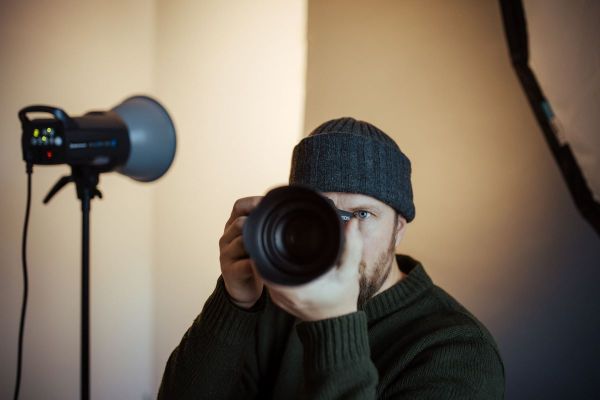Photographer
Photographers produce photos for different uses and publishing environments. Most photographers work as entrepreneurs or freelancers. In addition to photography skills, photographers are required to have good interaction skills and creativity.
As freelancers or entrepreneurs, as well as in newspapers, magazines, photo offices, publishers and photography shops. Also in research centres, industrial institutions, the Defence Forces, the police, state archives and hospitals.
Photographers must master the technical basics of photography, as well as the equipment required for photography, and know how to apply them in different situations to take good quality photographs. Most of the time in a photographer's work is spent editing images on a computer, so good IT and image processing skills are essential in the profession. In addition, a photographer must master the construction of the photography location and its equipment, as well as the planning and installation of lighting.
Photographers are expected to have creativity and a good visual eye, which are needed in designing the colours and composition of the images. Photographers often work with customers and models, so good interaction skills, situational awareness and building trust are important skills. The needs of customers must be listened to and information must be applied in practice.
A photographer working as a freelancer or entrepreneur must manage matters related to the company's operations, such as pricing and marketing.
At the university, you can study bachelor's and master's degrees in visual arts, with emphasis on photography and bachelor's and master's degrees in social sciences in the field of photo journalism. Photography at universities of applied sciences can be studied in the cultural field, in which case the degree is Bachelor of Culture and Arts or Visual Artist.
You can also complete a Vocational Qualification in Media and Visual Expression. Once competence has accumulated, a Further Vocational Qualification in Media (Photographer AT) and a Specialist Vocational Qualification (Photography Master) can also be completed. An upper secondary vocational qualification can also be completed through an apprenticeship.
Photography courses are organised in many educational institutions throughout the country, for example at night schools and adult education centres. Photographers are not necessarily required to have training, as many professionals in the field are self-learned.
Median salary
3588 €/mo
Private sector
3759 €/mo
Public sector
3175 €/mo
The data is based on the median income, meaning the amount of salary which is the middle of the salary amounts arranged in order of magnitude.
Source: Statistics Finland's structural statistics on wages and salaries
- advertising photographer
- aerial photographer
- architecture photographer
- art photographer
- backstage photographer
- commercial photographer
- corporate photographer
- culinary photographer
- cultural photographer
- documentary photographer
- event photographer
- fashion photographer
- food photographer
- graphical industry photographer
- illustration photographer
- industrial photographer
- interior photographer
- itinerant photographer
- landscape photographer
- medical photographer
- microphotographer
- photo designer
- photographer retoucher
- photographic artist
- photography assistant
- photography-based artist
- photography studio manager
- photography technician
- portrait photographer
- portrayist
- press photographer
- product photographer
- reportage photographer
- scene photographer
- school photographer
- scientific photographer
- social photographer
- sports photographer
- still life photographer
- still shooting photographer
- studio photographer
- technical photographer
- travel photographer
- underwater photographer
- video photographer
- wedding photographer
- wildlife photographer

